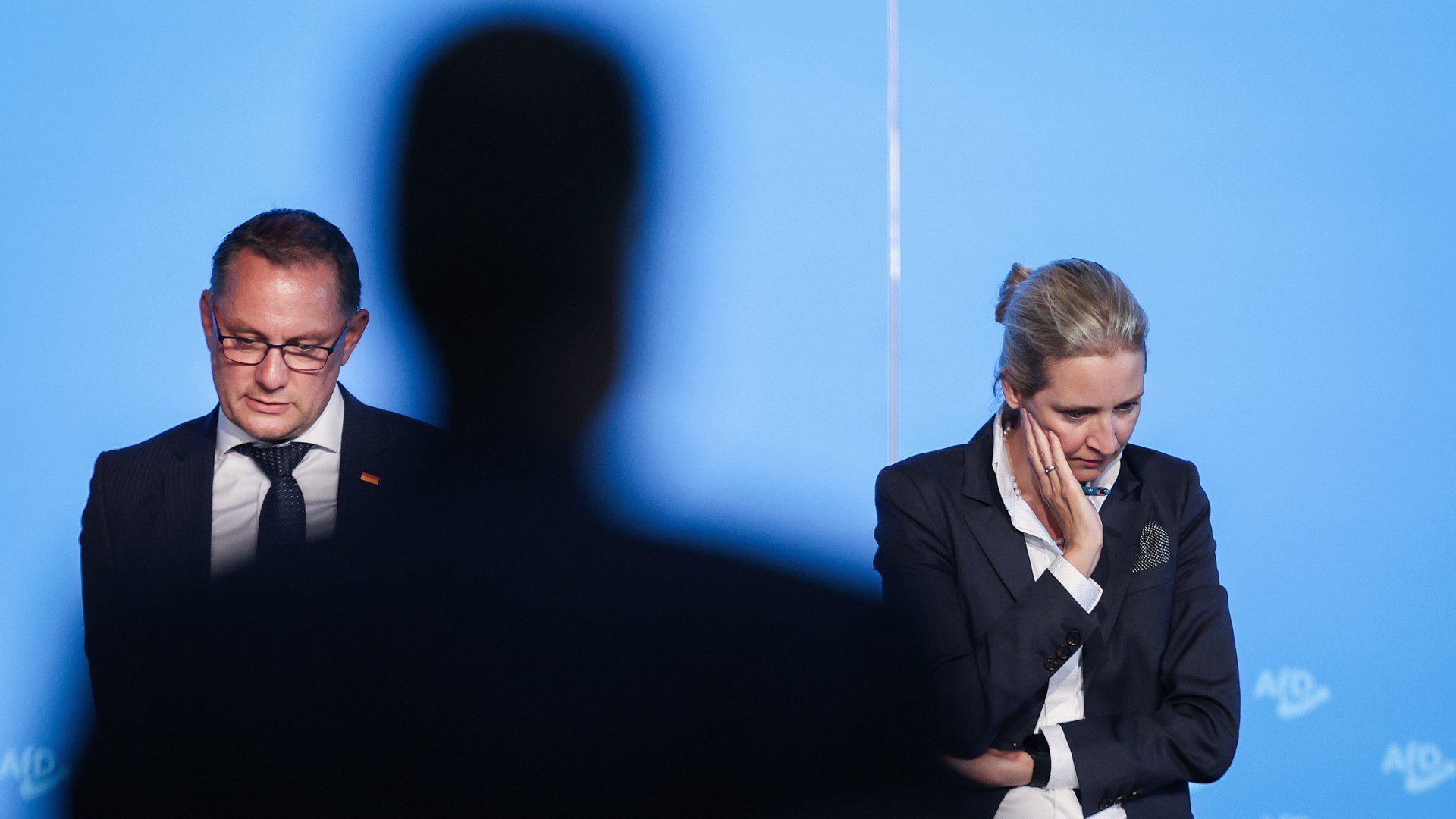
Alice Weidel (R) and Tino Chrupalla, both co-leaders and parliamentary group co-leaders of Alternative for Germany (AfD), react during the election for the fifth list position during the European Election Assembly at the AfD’s federal party congress in Magdeburg, eastern Germany on July 29, 2023.
Photo: Photo by Ronny HARTMANN / AFP
The President of the centrist European People’s Party (EPP) Manfred Weber has registered his concern about an ideological shift to the right within the German AfD after the populist party outlined a Eurocritical and NATO-critical programme ahead of EU elections next year.
His comments come on the back of a year-long internal EPP dispute as the group is torn on whether to embrace populist factions in the next EU parliamentary session to fend off the left after Weber himself made direct overtures to Italian PM Giorgia Meloni.
AfD delegates gathered in the East German city of Magdeburg throughout last week for their annual congress and to decide on a slate of candidates for European elections in a move many pundits believe solidified the hold of radical factions from the regional Thuringian branch of the party.
In the party’s subsequent election manifesto, released Sunday evening, the AfD described their wish to create a “federation of European nations” instead of the current homogenising EU structures as well as to curtail the influence of “non-European great powers” in EU foreign policy, a likely jab at Atlanticist influence over the Continent.
Poor economic conditions and dissatisfaction with German green and foreign policy have resulted in the AfD skyrocketing in opinion polls lately to become Germany’s second-largest party behind the conservative CDU.
Germany, INSA poll:
— Europe Elects (@EuropeElects) July 31, 2023
European parliament election
CDU/CSU-EPP: 26% (-3)
AfD-ID: 23% (+12)
SPD-S&D: 19% (+3)
GRÜNE-G/EFA: 15% (-6)
FDP-RE: 7% (+2)
LINKE-LEFT: 5% (-1)
+/- vs. 2019 election
Fieldwork: 31 July 2023
Sample size: 1,001 pic.twitter.com/Fno5LGWAyj
This ascent has challenged the post-war consensus about freezing the nationalist right out of any form of regional or national power as centre-right politicians ponder working with the populists.
While cooperation with populist parties has become increasingly common throughout Europe, the recent ideological turn to the anti-NATO right in the AfD has rattled many German conservatives as eastern hardliners exert their growing influence over the AfD’s policy direction and question the transatlantic alliance so heavily favoured by the German elite.
These conservative fears were not allayed by the election of prominent anti-NATO figures to the AfD’s candidate list for 2024 at the congress last week, including current MEP Maximilian Krah who came first in the party’s selection.
Among the additional decisions taken by the AfD during the Magdeburg congress was to formally apply to the right-wing Identity and Democracy (ID) group instead of the current arrangement where their MEPs apply individually. This is likely to create some upset within the ID group with the AfD’s new lead candidate for the European elections Maximilian Krah suspended from the parliament group over fraud allegations.
For Weber, himself a member of the Bavarian CSU, an alliance with the more moderately right-wing and pro-NATO ECR group within the Parliament is the more preferred course of action after the 2024 elections. This is however heavily opposed by conservatives in northern EU nations such as Germany and Sweden.
The EPP has been accused by the left in recent months of strategically dumping green policies in the lead-up to the European elections with ideological tensions within the centre right faction aired over the controversial passing of the Nature Restoration Law last month.
Weber is understood to be clashing with Commission President von der Leyen over the issue of integrating right-wing populists as many speculate the current EPP President is eyeing von der Leyen’s job after failing to become Commission President in 2019.
